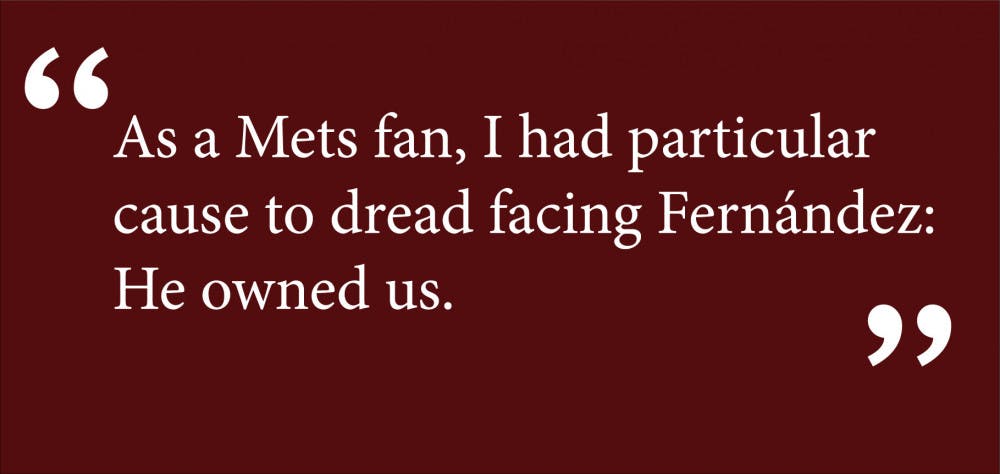When I awoke Sunday morning to the news that José Fernández had been killed in a boating accident off Miami Beach, I didn’t know how to react. I’m not sure anyone did.
The Marlins canceled their game, as was the right thing to do. Airwaves were inundated with club statements, updates and remembrances. On ESPN, Fernández’s former hitting coach broke down in tears multiple times during a seven-minute interview. During the broadcast of that day’s Mets-Phillies game, I watched game announcer Keith Hernandez do the same.
We heard all the stories about Fernández: the story of how he attempted to defect from Cuba three times and succeeded on the fourth; how he’d jumped into the water on the boat from Cuba to save a drowning woman who turned out to be his mother; how the Marlins managed to bring his grandmother to Florida and captured the reunion on tape.
None of the tributes was enough — because nothing could have been enough — but it was a start.
Meanwhile, I wasn’t sure what to think.
My history with Fernández goes back farther than most. The first Mets game I ever attended fully autonomously — paying for my own ticket and metro card and finding my way through the New York City subway system — was April 7, 2013. My friend and I sat near the field on the first base side. April 7, 2013 was also Fernández’s Major League debut.
I knew enough about Fernández to know how strange the circumstances were: Fernández came straight up from single-A ball to the majors. He was just 19 years old. The Marlins were desperate. But right off the bat, Fernández delivered.
He wasn’t perfect that day, but he was pretty darn impressive: He recorded five innings, eight strikeouts and one earned run. The Mets eventually salvaged the game, but I came away impressed with Fernández all the same.
His career numbers tell the rest of the story: a 38-17 record, 2.58 earned run average and an average of 11.2 strikeouts per nine innings. Fernández also earned a Rookie of the Year award, two all-star appearances and a third-place finish in the 2013 Cy Young award voting.
And as a Mets fan, I had particular cause to dread facing Fernández: He owned us.
Fernández made eight career starts against the Mets. In 47 innings, he was 3-0 with a 1.34 ERA and 59 strikeouts. We simply couldn’t touch him. Earlier this year, for example, as Mets pitcher Matt Harvey struggled to return to form, he took on Fernández. Harvey was brilliant: seven innings, one run and only four hits allowed.
But then you compared his outing to Fernández’s, and you realized what kind of talent you were facing: Fernández went seven scoreless innings, allowed four hits and struck out 14. That this was little more than a typical outing for him should go a long way toward showing how brilliant Fernández was.
Things didn’t always work out for Fernández. He tore his UCL in 2014, recovery from which set him back more than a year. But he came back as good as new: In his return, he pitched six innings, struck out six and hit a home run. Fernández always stayed up and ready — nothing got him down. What will now go down in the history books as Fernández’s last outing was another typically dominant one: eight shutout innings, three hits and 12 strikeouts.
But the last time I saw him was a few weeks before that.
Aug. 30, the Mets were playing the Marlins at Citi Field with wildcard positioning on the line, and I managed to find a cheap ticket right behind third base. From my seat, I could see into the Marlins dugout. Fernández watched from the top step almost the entire game. And each time he turned back toward the dugout, I saw the trademark smile on his face.
Besides his almost unrivaled talent on the mound, Fernández was a personification of happiness, the most important qualification there is on the way to becoming a baseball hero. Whether it was exulting in a teammate’s home run, staring in wonder as his own first home run left the park or snagging a line drive out of the air and then laughing at Troy Tulowitzki’s disbelief and saying, “Yeah, I caught it,” Fernández, everyone always knew, was as happy as he could be because he got to play baseball for a living.
Soon after the news of the accident, a photo began circulating that I think proves this better than anything. Taken by ESPN reporter Allison Williams, it shows Fernández after a win against the Dodgers, sitting in a folding chair on the field and watching the fireworks show going on above him.
“A big leaguer,” reads the caption, “but always kid at heart.”
It’s how every Major League ballplayer should strive to be seen. And I can think of few people more worthy of being remembered as eternal kids at heart than Fernández.
James Schapiro ’19 has never felt better about the Mets getting beat by the Marlins. He can be reached at james_schapiro@brown.edu. Please send responses to this opinion to letters@browndailyherald.com and other op-eds to opinions@browndailyherald.com.





